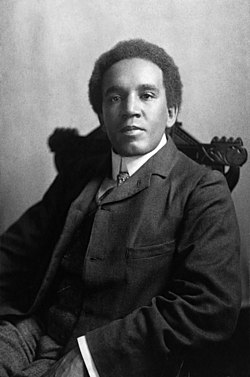热门问题
时间线
聊天
视角
塞缪尔·柯勒律治-泰勒
英国作曲家、指挥家(1875-1912) 来自维基百科,自由的百科全书
Remove ads
塞缪尔·柯勒律治-泰勒(英语:Samuel Coleridge-Taylor,1875年8月15日—1912年9月1日)是一名英国作曲家和指挥家,成名作是改编自美国亨利·华兹华斯·朗费罗的史诗《海华沙之歌》的同名清唱剧。
他虽有黑人血统,但仍在当时取得了巨大成功,以至于他在1900年代初在美国进行了巡回演出时,被纽约白人音乐家称为“非洲马勒”[1]。
早年

他出生于伦敦霍本的西奥博尔德路 (Theobalds Road)15号[2],母亲是英格兰人爱丽丝·黑尔·马丁(Alice Hare Martin,1856–1953)[3],父亲是塞拉利昂克里奥尔人丹尼尔·彼得·休斯·泰勒(Daniel Peter Hughes Taylor),一名医生和政治家。他的父母没有结婚,丹尼尔在不知道爱丽丝怀孕的情况下回到了非洲[4],爱丽丝以诗人塞缪尔·泰勒·柯勒律治的名字命名了她的儿子[5]。他名字中的连接符可能是源自出版商的印刷错误[6]。
爱丽丝生下这个男孩后,与她的父亲本杰明·霍尔曼斯(Benjamin Holmans)及其家族住在一起。她自己的父母也是未婚先孕,父亲是个熟练的蹄铁匠,后娶了一个不是她母亲的女人,并育有四女和至少一个儿子。这家人住在萨里郡的克罗伊登。1887年,爱丽丝·马丁与铁路工人乔治·埃文斯(George Evans)结婚。[7]
泰勒在克罗伊登长大。他母亲认识不少懂音乐的人,他的外祖父就能拉小提琴。他小时候跟随外祖父学习,后来又出钱让他上小提琴课。15岁开始,他在皇家音乐学院学习,并转学作曲,师从查尔斯·维利尔斯·斯坦福。获得学位后,泰勒成为一名职业音乐家,不久被任命为水晶宫学校(Crystal Palace School)教授;并在克罗伊登音乐学院(Croydon Conservatoire)指挥管弦乐队。
Remove ads
婚姻

1899年,柯勒律治-泰勒与杰西·沃尔米斯利(Jessie Walmisley,1869-1962)结婚,后者是他在皇家音乐学院的同学,比他大六岁。她的父母因为泰勒是混血儿而反对这桩婚事,但后来还是接受了他并参加了两人的婚礼。他们育有一子海华沙(Hiawatha,1900-1980)和一女格温多林· 艾薇尔(Gwendolyn Avril,1903-1998),后来都从事音乐相关事业。海华沙改编过他父亲的作品[8]。格温多林则是一名作曲家、指挥家。
职业
1896年左右,爱德华·埃尔加向三合唱团音乐节推荐了他,他的《A小调叙事曲》(Ballade in A minor)在那里首演。1898年,他的海华沙三部曲第一部《海华沙的婚宴》(Hiawatha's Wedding Feast)由老师查尔斯·维利尔斯·斯坦福指挥、首演,大获成功,柯勒律治-泰勒因此在美国进行了三次巡回演出[9]。在美国,他对父亲的种族传统越来越感兴趣,曾作为最年轻的代表参加1900年在伦敦举行的第一次泛非会议(First Pan-African Conference),由此与保罗·劳伦斯·邓巴和W·E·B·杜波依斯结识[9]。
1904年,柯勒律治-泰勒在白宫受到西奥多·罗斯福总统的接见,当时这对非洲裔男子来说是很罕见的。他的音乐流传开来,并得到了非裔美国人的大力支持。柯勒律治-泰勒试图从传统的非洲音乐中汲取灵感,并将其融入古典音乐中,就像约翰内斯·勃拉姆斯对匈牙利音乐、安东宁·德沃夏克对波西米亚音乐所做的那样。在伦敦结识保罗·劳伦斯·邓巴后,泰勒为他的一些诗歌配乐。在美国大使海约翰的赞助下,泰勒和邓巴在伦敦举行了一场联合演奏会[10]。
不过,虽然他的音乐十分流行,但由于版权低价卖给了出版商,柯勒律治-泰勒只得到15基尼报酬[11][12][13]。他37岁就死于肺炎,这可能要归咎于他的财务压力[14]。他被安葬在萨里郡瓦灵顿的班顿山公墓(Bandon Hill Cemetery)[15]。他的妻子杰西和他的儿女活得都比他久。
作品
- Piano Quintet in G minor, Op. 1 – 1893
- Nonet in F minor for oboe, clarinet, bassoon, horn, violin, viola, cello, contrabass and piano, Op. 2 – 1894
- Suite for Violin and Organ (or piano), Op. 3 (Suite de Piêces)- 1893
- Ballade in D minor, Op. 4 – 1895
- Five Fantasiestücke, Op. 5 – 1896
- Little Songs for Little Folks, Op. 6 – 1898
- Zara's Earrings, Op. 7 – 1895
- Symphony in A minor, Op. 8 – 1896
- Two Romantic Pieces, Op. 9 – 1896
- Quintet in F sharp minor for clarinet and strings, Op. 10 – 1895
- Southern Love Songs, Op. 12 – 1896
- String Quartet in D minor, Op. 13 – 1896 (lost)
- Legend (Concertstück), Op. 14
- Land of the Sun, Op. 15 – 1897
- Three Hiawatha Sketches for violin and piano, Op. 16 – 1897
- African Romances (P. L. Dunbar) Op. 17 – 1897
- Morning and Evening Service in F, Op. 18 – 1899
- Two Moorish Tone-Pictures, Op. 19 – 1897
- Gypsy Suite, Op. 20 – 1898
- Part Songs, Op. 21 – 1898
- Four Characteristic Waltzes, Op. 22 – 1899
- Valse-Caprice, Op. 23 – 1898
- In Memoriam, three rhapsodies for low voice and piano, Op. 24 – 1898
- Dream Lovers, Operatic Romance, Op. 25 – 1898
- The Gitanos, cantata-operetta, Op. 26 – 1898
- Violin Sonata in D minor, Op. 28 – ?1898 (pub. 1917)
- Three Songs, Op. 29 – 1898
- The Song of Hiawatha, Op. 30 ("Overture to The Song of Hiawatha", 1899; "Hiawatha's Wedding Feast", 1898; "The Death of Minnehaha", 1899; "Hiawatha's Departure", 1900)
- Three Humoresques, Op. 31 – 1898
- Ballade in A minor, Op. 33 – 1898
- African Suite, Op. 35 – 1899
- Six Songs, Op. 37
- Three Silhouettes, Op. 38 – 1904
- Romance in G, Op. 39 – 1900
- Solemn Prelude, Op. 40 – 1899
- Scenes From An Everyday Romance, Op. 41 – 1900
- The Soul's Expression, four sonnets, Op. 42 – 1900
- The Blind Girl of Castél-Cuillé, Op. 43
- Idyll, Op. 44 – 1901
- Six American Lyrics, Op. 45 – 1903
- Concert Overture, Toussaint L'Ouverture, Op. 46 – 1901
- Hemo Dance, scherzo, Op. 47(1) – 1902
- Herod, incidental music, Op. 47(2) – 1901
- Meg Blane, Rhapsody of the Sea, Op. 48 – 1902
- Ullyses, incidental music, Op. 49 – 1902
- Three Song Poems, Op. 50 – 1904
- Four Novelletten, Op. 51(1?) – 1903
- Ethiopia Saluting the Colours, march, Op. 51(2?) – 1902
- The Atonement, sacred cantata, Op. 53 – 1903
- Five Choral Ballads, Op. 54 – 1904
- Moorish Dance, Op. 55 – 1904
- Three Cameos for Piano, Op. 56 – 1904
- Six Sorrow Songs, Op. 57 – 1904
- Four African Dances, Op. 58 – 1904
- Twenty-Four Negro Melodies, Op. 59(1) – 1905
- Romance, Op. 59(2) – 1904
- Kubla Khan, rhapsody, Op. 61 – 1905
- Nero, incidental music, Op. 62 – 1906
- Symphonic Variations on an African Air, Op. 63 – 1906
- Scenes de Ballet, Op. 64 – 1906
- Endymion's Dream, one-act opera, Op. 65 – 1910
- Forest Scenes, Op. 66 – 1907
- Part Songs, Op. 67 – 1905
- Bon-Bon Suite, Op. 68 – 1908
- Sea Drift, Op. 69 – 1908
- Faust, incidental music, Op. 70 – 1908
- Valse Suite: "Three fours", Op. 71- 1909
- Thelma, opera in three acts, Op. 72 – 1907-09
- Ballade in C minor, Op. 73 – 1909
- Forest of Wild Thyme, incidental music, Op. 74 (five numbers) – 1911–25
- Rhapsodic Dance, The Bamboula, Op. 75 – 1911
- A Tale of Old Japan, Op. 76 – 1911
- Petite Suite de Concert, Op. 77 – 1911
- Three Impromptus, Op. 78 – 1911
- Othello, incidental music, Op. 79 – 1911
- Violin Concerto in G minor, Op. 80 – 1912
- Two Songs for Baritone Voice, Op. 81 – 1913
- Hiawatha Ballet in five scenes, Op. 82 – 1920[16]
无作品号
- Trio in E minor (1893)
- The Lee Shore
- Eulalie
- Variations for Cello and Piano
Remove ads
参考文献
外部链接
Wikiwand - on
Seamless Wikipedia browsing. On steroids.
Remove ads

